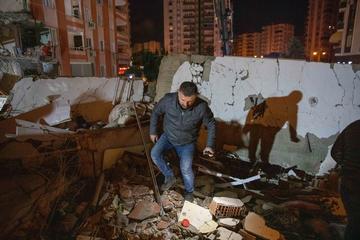
The Media Freedom Rapid Response (MFRR) coalition expresses its condolences with the victims of the devastating earthquakes in Turkey and reiterate the need for a free media atmosphere as a crucial element of all disaster relief processes
In the aftermath of the devastating earthquakes with epicentre in the province of Kahramanmaraş in Turkey on Monday 6 February 2023, MFRR partners have received multiple reports of press and media freedom violations including detentions of journalists and media workers, investigations for incitement to hatred in society, limitations on access to impacted areas, as well as throttling of bandwidth for social media platform Twitter.
On 7 February, the Turkish government’s Communications Directorate launched the “Disinformation Reporting Service ”, encouraging citizens to report accounts that share “manipulative” news reports and social media posts.
Later in the day, as President Erdoğan declared State of Emergency Rule for three months covering the ten affected provinces, he made a statement concerning the news coverage of the disaster, saying that “we are closely monitoring those who are trying to polarise the nation through false news … and our prosecutors will do what is necessary against those who aim to incite social chaos through disinformation and fake news." Turkish broadcast regulator Radio & TV Higher Council (RTÜK) president Ebubekir Şahin also warned against “demoralising ” media coverage of the destructive earthquakes and announced that they are monitoring TV networks for such reporting.
At least two journalists were arrested on Tuesday: Evrensel journalist Volkan Pekal was detained while taking photos in an earthquake-hit area in Adana and in Istanbul; and Daktilo1984 political commentator Özgün Emre Koç was taken into custody for his comments on social media stating that earthquake regulations are not properly implemented. He spent the night in jail accused of “incitement to violence and hatred”. Criminal investigations were also initiated against journalists Merdan Yanardağ and Enver Aysever for their criticism of islamist groups’ chanting when search and rescue teams required silence, and of the rescue efforts, respectively. Yanardağ was also the target of trolling by pro-government social media users. Furthermore, there were multiple reports of journalists being blocked from covering the rescue efforts in Diyarbakır .
On Wednesday 8 February, Mesopotamia News Agency reporter Mehmet Güleş was detained together with the person he was interviewing in Diyarbakır, as the interviewee criticised the rescue efforts. In Şanlıurfa's Birecik , another Mesopotamia News Agency reporter, Mahmut Altıntaş, and Jinnews reporter Sema Çağlak were detained while covering the news for not having government-issued press cards, as required under the State of Emergency rules. These oblige local journalists to obtain turquoise press cards and international media to obtain accreditation from local offices of the Communications Directorate. The two journalists were later released but the press cards issued by their outlets were confiscated. Multiple other journalists in Diyarbakır reported that they were blocked by police and the local Disaster and Emergency Management Authority (AFAD) officers from reporting from the field for not having government-issued press credentials. On 9 February, local Communications Directorate officers told Media and Law Studies Association that local journalists would now be allowed to work on the basis of their corporate press cards or assignment letters.
In the afternoon of 8 February, amidst an already problematic information landscape due to damaged infrastructure, widespread reports emerged that access to Twitter was limited from Turkey for six hours. Social media platforms have been playing a key role for victims to share their exact location and to amplify their voices, as rescue and relief teams coordinate efforts on a digital disaster-map . In this context, limiting access to Twitter prevents journalists from informing their audiences, hinders people’s right to access information and creates a major additional and unnecessary challenge for emergency support and relief.
While the country suffers through the impact of these devastating earthquakes, we underline the importance of an independent and pluralistic media landscape, also in the light of the upcoming parliamentary and presidential elections reportedly scheduled for May 2023. The MFRR partners call upon the Turkish authorities to immediately lift the restrictions on access to information and freedom of expression, and to ensure that journalists and media workers are not blocked from covering the news.
Signed by:
ARTICLE 19 Europe
European Centre for Press and Media Freedom (ECPMF)
European Federation of Journalists (EFJ)
International Press Institute (IPI)
OBC Transeuropa (OBCT)

 Turkey: call on local authorities to respect media freedom in the aftermath of devastating earthquakes
Turkey: call on local authorities to respect media freedom in the aftermath of devastating earthquakes



 Tutti i contenuti disponibili sul sito di Osservatorio Balcani e Caucaso sono distribuiti con licenza
Tutti i contenuti disponibili sul sito di Osservatorio Balcani e Caucaso sono distribuiti con licenza 